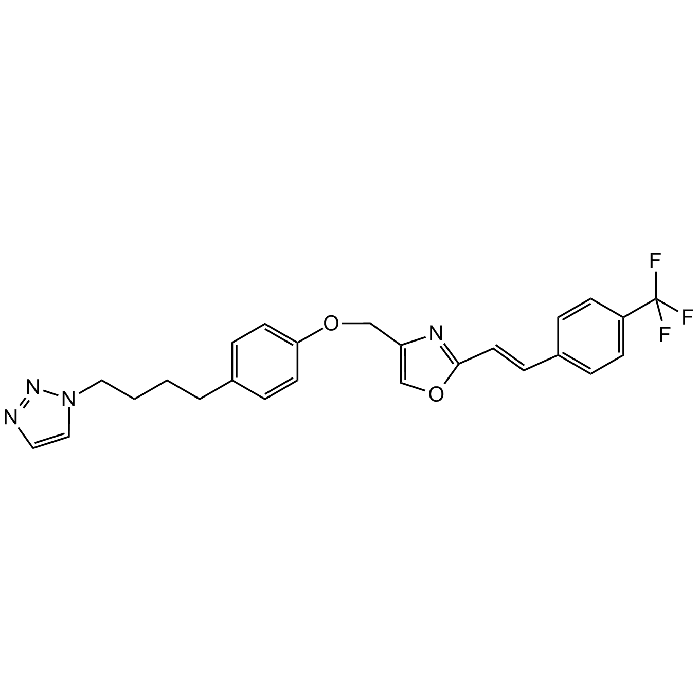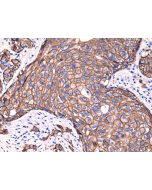Cookie Policy: This site uses cookies to improve your experience. You can find out more about our use of cookies in our Privacy Policy. By continuing to browse this site you agree to our use of cookies.
AdipoGen Life Sciences
Mubritinib
As low as
35
CHF
CHF 35.00
In stock
Only %1 left
AG-CR1-3755-M0055 mgCHF 35.00
AG-CR1-3755-M02525 mgCHF 140.00

| Product Details | |
|---|---|
| Synonyms | TAK-165; TAK 165; CID 6444692 |
| Product Type | Chemical |
| Properties | |
| Formula |
C25H23F3N4O2 |
| MW | 468.5 |
| CAS | 366017-09-6 |
| Purity Chemicals | ≥95% |
| Appearance | White to off-white solid. |
| Solubility | Soluble in DMSO (5mg/ml) or ethanol (1mg/ml). |
| Identity | Determined by 1H-NMR |
| InChi Key | ZTFBIUXIQYRUNT-MDWZMJQESA-N |
| Smiles | FC(F)(F)C(C=C1)=CC=C1/C=C/C2=NC(COC3=CC=C(CCCCN4N=NC=C4)C=C3)=CO2 |
| Shipping and Handling | |
| Shipping | AMBIENT |
| Short Term Storage | +4°C |
| Long Term Storage | -20°C |
| Handling Advice | Keep cool and dry. |
| Use/Stability | Stable for at least 2 years after receipt when stored at -20°C. |
| Documents | |
| MSDS |
 Download PDF Download PDF |
| Product Specification Sheet | |
| Datasheet |
 Download PDF Download PDF |
Description
- Mubritinib (TAK-165) is a selective inhibitor of the human epidermal growth factor receptor 2 (EGFR2; HER2), inhibiting HER2 phosphorylation with an IC50 value of 6nM. It is 4000-fold selective over EGFR, FGFR, PDGFR, JAK1, Src and Blk (IC50 > 25μM).
- Mubritinib inhibits the proliferation of breast, bladder, kidney and prostate cancer cells in vitro and in vivo.
- Mubritinib was shown to inhibit autophagy in a HER2-independent manner in cancer cells.
- Recently Mubritinib has been shown to be a mitochondrial electron transport chain complex I (NADH-CoQ reductase) inhibitor. Mubritinib functions through ubiquinone-dependent inhibition of electron transport chain (ETC) complex I activity and consequently oxidative phosphorylation (OXPHOS). This agent could be useful for immunometabolism research. Inhibition of electron transport chain in mitochondria leads to blocking of the transfer of electrons from iron-sulfur centers in complex I to ubiquinone. By inhibiting the mitochondrial respiratory complex I, this agent reduces cardiac-cell beat rate, with prolonged exposure resulting in cell death. Complex I inhibition is directly linked to anti-cancer cell activity.
Product References
- Inhibitors of epidermal-growth-factor receptors: a review of clinical research with a focus on non-small-cell lung cancer: S.S. Sridhar, et al.; Lancet Oncol. 4, 397 (2003) (Review)
- Novel HER2 selective tyrosine kinase inhibitor, TAK-165, inhibits bladder, kidney and androgen-independent prostate cancer in vitro and in vivo: J. Nagasawa, et al.; Int. J. Urol. 13, 587 (2006)
- Small molecule HER-2 tyrosine kinase inhibitors: N. Spector, et al.; Breast Cancer Res. 9, 205 (2007)
- Mubritinib is used in selective targeting of CTNNB1-, KRAS-or MYC-driven human cancer cell growth by combinations of existing drugs: J.C. Uitdehaag, et al.; PLoS One 10, 0125021 (2015)
- Synergistic effect of a novel autophagy inhibitor and Quizartinib enhances cancer cell death: A.T. Ouchida, et al.; Cell Death Dis. 9, 138 (2018)
- Mubritinib Targets the Electron Transport Chain Complex I and Reveals the Landscape of OXPHOS Dependency in Acute Myeloid Leukemia: I. Baccelli, et al.; Cancer Cell 36, 84 (2019)
- Identification of Mubritinib (TAK 165) as an inhibitor of KSHV driven primary effusion lymphoma via disruption of mitochondrial OXPHOS metabolism: A. Calderon, et al.; Oncotarget 11, 4224 (2020)
- Identification of a novel toxicophore in anti-cancer chemotherapeutics that targets mitochondrial respiratory complex I: Z.A. Stephenson, et al.; Elife 9, e55845 (2020)






